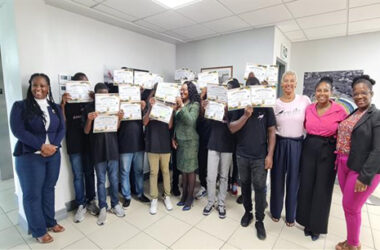The Saint Lucia National Reparations Committee (NRC) was represented last weekend at the 10th Anniversary celebrations of the National Reparations Commission of Martinique (CNR).
The activity spanned over two days, the first on November 11 – Armistice Day holiday on the island — featuring exchanges between the NRCs of Guadeloupe, Martinique and Saint Lucia, on respective experiences in spreading the reparations message and gathering public support.
On the first day at the CNR’s event in Domaine Tivoli, the foreign and local delegates met under the theme ‘Advancing Reparations in the Caribbean’, starting with a ‘Homage to Ancestors’ through a libation ceremony led by CNR President Gabrielle Privat.
During the exchange, President Privat gave a brief review of the CNR’s first decade, highlighting many of the usual problems faced by entities at birth, which learn hard lessons along the way.
She also shared several similar experiences relating to making the connection of new concepts and themes to a citizenry hardened by French colonialism.
President Privat invited participants to treat the weekend gathering as a new partnership between Caribbean NRCs in independent and non-independent Caribbean islands and territories, especially as descendants of enslaved Africans were brought to the Caribbean ‘on the same ship’.
The primary presenter was Garcin Malsa, Founding President of the CNR, who’s also a popular radical former local government municipal leader in Saint Anne.
He explained the intricacies involved in application of French law to the spreading of the reparations message in its colonies, such as political restrictions on access to public facilities like schools, municipal buildings and most other venues under state control, for such progressive purposes of public interest.
Malsa, who led and participated in several public protests and other forms of agitation in Martinique during the first seven years of the CNR, noted the lingering effects of the traditional hostility of the French state to Reparations demands, whether from Haiti, African or Caribbean states and French Caribbean colonies.
He also noted the demographic changes that required new approaches to spreading the Reparations message, if it’s to get to today’s younger generation.
Malsa also highlighted a need for continuing Caribbean support for African inclusion in the global reparations thrust.
The CNR’s founding president recommended that the reparations movements and NRCs in the French and creole-speaking Caribbean islands (Dominica, Haiti, Guadeloupe, Martinique and Saint Lucia) ‘do more’ to share and learn from common and different experiences, especially as the Caribbean Community (CARICOM) CNRs are also ten years old.
Henri Dorol, President of the Guadeloupe CNR, spoke of the similar and different experiences in the twin-island French-Caribbean colony, with special mention of the need to ‘refine approaches to attracting youth and students who grew-up under French colonial influence’ to listen to the reparations message.
Dorol also endorsed Malsa’s call for closer cooperation between the NRCs and CNR’s in the Creole-speaking Caribbean, as well as the closer cooperation that would emerge from the first global reparations summit due the following week in Ghana, also attended by Caribbean delegates.
Bongo Wisely Tafari, president of the Caribbean Rastafari Organization (CRO) and a founding member of the Saint Lucia NRC, highlighted the historical role of the Rastafari movement in lighting the Reparations and Repatriation movements in the Caribbean.
He also spoke of the CRO’s support for calls by the movement for removal of restrictions and implementation of new and more-embracing laws and actions by governments for Caribbean nationals who wish to return to Africa.
Saint Lucia NRC’s President Earl Bousquet offered a global review of the birth and growth of the CARICOM Reparations Commission (CRC) and the various NRCs, underlining their easier access to public funds and facilities, as creatures of CARICOM Governments.
He invited the Martinique and Guadeloupe CNRs to work with the CRC and the Saint Lucia and Dominica NRCs, to collaborate in methods of spreading the message through their common creole language. He also noted the Saint Lucia NRC’s successes, over time, in use of today’s Information Technology, among other means, to access youth and students.
The second day, at Villa FL Californie in Lamentin, featured the actual celebration ceremony of the CNR’s 10th anniversary, invited guests also attending.
The well-attended Sunday event featured opening addresses by the visiting delegates from neighboring islands and included an hour of African drumming and blowing of conch shells, as well as a song-and-dance musical interlude by Le Trio des Freres Cayol.
The closing session also featured raffles and other side events to pull the curtains on CNR’s celebration of its first decade with an extension of communication across the waters to fellow creole-speaking states, Dominica and Saint Lucia, which also share the scars of French colonialism and slavery, as fellow people of African Descent.





